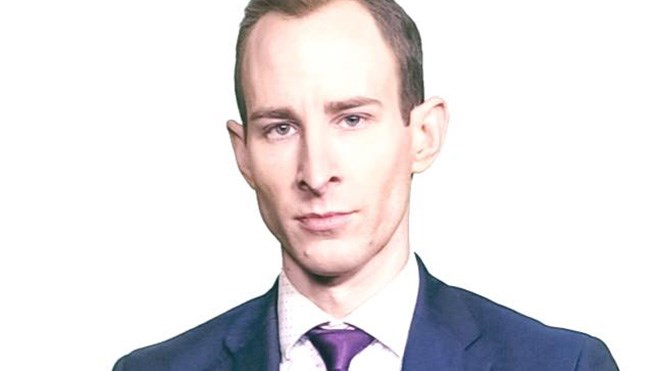Former Sudbury TV reporter Callam Senyk-O’Flanagan was handed a nine-month conditional sentence on Thursday after pleading guilty to committing an indecent act by making child sexual abuse material available to the public through the use of digital file-sharing software.
That conditional sentence will see Senyk-O’Flanagan serve 4.5 months under house arrest, followed by a strict curfew for the remainder of the conditional sentence, then one year of probation.
Senyk-O’Flanagan will be fitted with electronic monitoring equipment. He will also have to surrender a DNA sample, and numerous restrictions have been placed on him during both his house arrest and probation. He is not required to register with the Sex Offender Registry.
When he was arrested on Feb. 13, 2019, he was charged with two counts of accessing, five counts of possession, and three counts of making available child pornography. The Crown withdrew those charges.
Senyk-O’Flanagan was also charged with drug possession, but that was also dropped.
The sentence was arrived at in a joint submission by the Crown and defence lawyer Michael Lacy.
The joint submission is the product of extensive discussions between all parties, and “we're confident that this sentence is one that would not bring the administration of justice into disrepute,” said Lacy.
“My client has taken responsibility for what he did,” Lacy told Ontario Court Justice Pierre Bradley. “He appreciates and understands the seriousness of the underlying conduct. He has pleaded guilty to accepting that responsibility.”
Assistant Crown attorney Christina Croteau reiterated to the court police located 464 items identified as child sexual abuse material on Senyk-O’Flanagan’s computer.
‘Significant issues’ with the investigation
Croteau said the Crown agreed to a lesser offence in this case, as well as a lower sentence that an offence of this type would ordinarily attract, as there were significant issues stemming from the investigation by Greater Sudbury Police Service, had it gone to trial.
Lacy told the court there was “troubling police conduct” in this case, and that the detective, Det. Const. Chris Kerr, engaged in “questionable and unconstitutional conduct” that would have “given rise to significant triable and constitutional issues.”
Specifically, Senyk-O’Flanagan was not brought to bail court within 24 hours of his arrest. He was also questioned briefly by a detective after being advised of his right to counsel, but before he was able to exercise that right, both the defence and Crown said.
“In these circumstances, the sentence proposed addresses denunciation and deterrence, and the need for rehabilitation in this case,” Croteau said.
Lacy said the same issues arose in another child pornography case against Sudbury nephrologist Dr. Ian MacDonald. Charges against him were ultimately withdrawn as a result of investigative techniques used by Kerr.
“What came to light was that there was a systemic pattern, in my submission, of Det. Kerr violating detainees Section 10B Charter rights,” Lacy said. “He’s been doing it for some time, believing he was entitled to do so.”
He said the detective would provide detainees with their clear right to counsel, but then prior to a detainee being able to speak to a lawyer, he would “attempt to extract incriminating information from them, believing he was lawfully entitled to do so. He was obviously completely wrong in that regard.”
The court heard there were also questions about how Kerr executed search warrants, and there was a systemic policy at the time that officers or Det. Kerr would affect arrests early in the morning. Then, rather than bringing detainees to bail court within 24 hours as required by the Criminal Code, detainees would be held in custody and often not get to bail court until beyond the 24 hours, Lacy said.
“I raise this not to suggest anything other than that these are the types of issues that would have been explored had this matter gone to trial,” Lacy said. “This was not a case where it was inevitable that Mr. Senyk-O’Flanagan would have been convicted of anything. In fact, there were significant triable issues that would have been the subject of a Section 8 and Section 10B charter challenge.”
‘Lessons learned’
In an email statement, GSPS spokesperson Kaitlyn Dunn said the service has not had the opportunity to review the specifics of the Senyk-O’Flanagan’s case with the Crown attorney, including the factors that impacted and contributed to the sentencing, however, the errors that were previously identified have been addressed through both specific and general training.
“We continue to work collaboratively with the Crown’s office in order to ensure the accurate application of law and that our investigative procedures reflect that,” the statement said. “We are committed to moving forward with these lessons learned, and our ultimate goal is to serve victims and survivors of crime and to do our part to hold offenders accountable.”
The errors made by Det.-Const. Kerr did not meet the threshold for discipline, she said.
Senyk-O’Flanagan addressed the court, saying he let down the community he loves.
“I threw away everything I cared about, and it will haunt me for the rest of my life,” he said.
He said he allowed curiosity to take over and corrupt his moral integrity.
“This is not an excuse,” he said. “I realize what I did victimizes others, and for that, I am truly sorry. I hope you will see there is so much more to me than what brings me before the court. I am humbled and humiliated. I can and will do better. I promise this will be the last time you see me before the court as a defendant.”
Senyk-O’Flanagan said since his arrest, he has been diagnosed with bipolar disorder and a substance abuse disorder.



